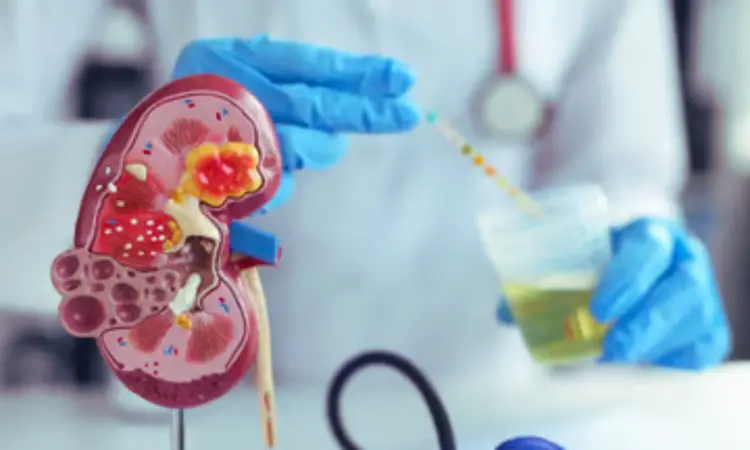- Home
- Medical news & Guidelines
- Anesthesiology
- Cardiology and CTVS
- Critical Care
- Dentistry
- Dermatology
- Diabetes and Endocrinology
- ENT
- Gastroenterology
- Medicine
- Nephrology
- Neurology
- Obstretics-Gynaecology
- Oncology
- Ophthalmology
- Orthopaedics
- Pediatrics-Neonatology
- Psychiatry
- Pulmonology
- Radiology
- Surgery
- Urology
- Laboratory Medicine
- Diet
- Nursing
- Paramedical
- Physiotherapy
- Health news
- Fact Check
- Bone Health Fact Check
- Brain Health Fact Check
- Cancer Related Fact Check
- Child Care Fact Check
- Dental and oral health fact check
- Diabetes and metabolic health fact check
- Diet and Nutrition Fact Check
- Eye and ENT Care Fact Check
- Fitness fact check
- Gut health fact check
- Heart health fact check
- Kidney health fact check
- Medical education fact check
- Men's health fact check
- Respiratory fact check
- Skin and hair care fact check
- Vaccine and Immunization fact check
- Women's health fact check
- AYUSH
- State News
- Andaman and Nicobar Islands
- Andhra Pradesh
- Arunachal Pradesh
- Assam
- Bihar
- Chandigarh
- Chattisgarh
- Dadra and Nagar Haveli
- Daman and Diu
- Delhi
- Goa
- Gujarat
- Haryana
- Himachal Pradesh
- Jammu & Kashmir
- Jharkhand
- Karnataka
- Kerala
- Ladakh
- Lakshadweep
- Madhya Pradesh
- Maharashtra
- Manipur
- Meghalaya
- Mizoram
- Nagaland
- Odisha
- Puducherry
- Punjab
- Rajasthan
- Sikkim
- Tamil Nadu
- Telangana
- Tripura
- Uttar Pradesh
- Uttrakhand
- West Bengal
- Medical Education
- Industry
Novel aldosterone synthase inhibitor with concurrent empagliflozin reduces albuminuria in CKD patients: Lancet

USA: A randomised, controlled, phase 2 trial published in The Lancet has shed light on the safety and efficacy of aldosterone synthase inhibition with and without empagliflozin for chronic kidney disease (CKD).
The study revealed a dose-dependent reduction in albuminuria with BI 690517, an aldosterone synthase inhibitor, with concurrent renin–angiotensin system inhibition and empagliflozin. The findings suggest an additive efficacy for CKD treatment without unexpected safety signals.
Excess aldosterone accelerates the progression of chronic kidney disease. The multinational, randomised, controlled, phase 2 clinical trial by Katherine R Tuttle, University of Washington, Seattle, WA, USA, and colleagues assessed BI 690517 for safety, efficacy, and dose selection.
The trial enrolled patients 18 years or older with an estimated glomerular filtration rate (eGFR) of 30 to less than 90 mL/min/1·73 m2, serum potassium of 4·8 mmol/L or less, and urine albumin to creatinine ratio (UACR) of 200 to less than 5000 mg/g, taking an angiotensin receptor blocker or angiotensin-converting enzyme inhibitor.
Participants were randomly assigned in the ratio of 1:1 to receive empagliflozin or placebo run-in for 8 weeks, followed by a second randomization in the ratio of 1:1:1:1 to 14 weeks of treatment with once per day BI 690517 at doses of 20 mg, 10 mg, 3 mg, or placebo.
The study's primary endpoint was the change in UACR measured in first-morning void urine from baseline (second randomisation) to the end treatment.
Of the 714 run-in participants, 586 were randomly assigned to receive BI 690517 or a placebo between Feb 18 and Dec 30, 2022. At baseline 67% were men, and the mean participant age was 63·8 years. The mean baseline eGFR was 51·9 mL/min/1·73 m2 (17·7) and the median UACR was 426 mg/g.
Based on the study, the researchers reported the following findings:
· Percentage change in first-morning void UACR from baseline to the end of treatment at week 14 was –3% with placebo, –22% with BI 690517 3 mg, –39% with BI 690517 10 mg, and –37% with BI 690517 20 mg monotherapy.
· BI 690517 produced similar UACR reductions when added to empagliflozin.
· Investigator-reported hyperkalaemia occurred in 10% of those in the BI 690517 3 mg group, 15% in the BI 690517 10 mg group, 18% in the BI 690517 20 mg group, and 6% of those receiving placebo, with or without empagliflozin.
· Most participants with hyperkalaemia did not require intervention (86%).
· Adrenal insufficiency was an adverse event of special interest reported in seven of 436 study participants (2%) receiving BI 690517 and one of 147 participants (1%) receiving matched placebo.
· No treatment-related deaths occurred during the study.
"BI 690517 dose-dependently lowered albuminuria with concurrent renin–angiotensin system inhibition and empagliflozin, indicating an additive efficacy for CKD treatment without unexpected safety signals," the researchers wrote.
Reference:
Tuttle KR, Hauske SJ, Canziani ME, Caramori ML, Cherney D, Cronin L, Heerspink HJL, Hugo C, Nangaku M, Rotter RC, Silva A, Shah SV, Sun Z, Urbach D, de Zeeuw D, Rossing P; ASi in CKD group. Efficacy and safety of aldosterone synthase inhibition with and without empagliflozin for chronic kidney disease: a randomised, controlled, phase 2 trial. Lancet. 2023 Dec 15:S0140-6736(23)02408-X. doi: 10.1016/S0140-6736(23)02408-X. Epub ahead of print. PMID: 38109916.
Dr Kamal Kant Kohli-MBBS, DTCD- a chest specialist with more than 30 years of practice and a flair for writing clinical articles, Dr Kamal Kant Kohli joined Medical Dialogues as a Chief Editor of Medical News. Besides writing articles, as an editor, he proofreads and verifies all the medical content published on Medical Dialogues including those coming from journals, studies,medical conferences,guidelines etc. Email: drkohli@medicaldialogues.in. Contact no. 011-43720751


